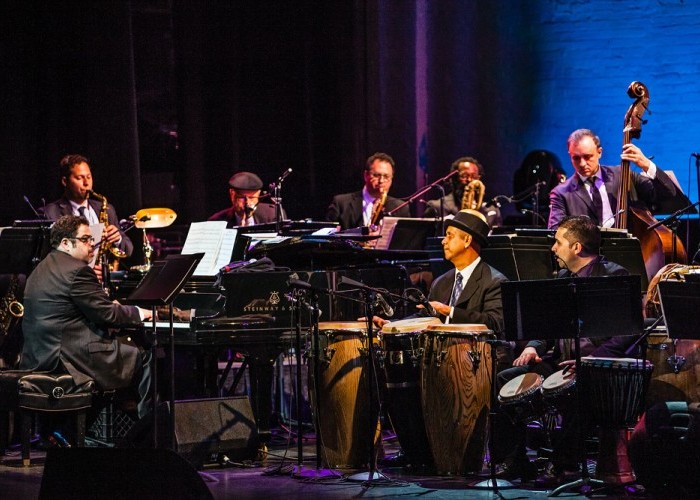Jan 13, 2026 2:09 PM
More Trump-Kennedy Center Cancellations
The fallout from the renaming of the John F. Kennedy Center for the Performing Arts to include President Donald…

Arturo O’Farrill’s Afro Latin Jazz Orchestra seemed to summon the socio-political works of Charles Mingus at a recent performance at the Strathmore Music Center in Bethesda, Maryland.
(Photo: Courtesy of the Artist)Arturo O’Farrill’s Afro Latin Jazz Orchestra embraced a wealth of jazz history during its winning performance at the Bethesda, Maryland, Strathmore Music Center on Feb. 2.
The 18-piece ensemble also made knowing gestures toward iconic pillars of Latin jazz that included Chano Pozo, Mario Bauza, Dizzy Gillespie and of course, the pianist’s father, Chico O’Farrill. The bandleader firmly planted the music within the expansive idiomatic prism of modern Afro-Latin jazz. Interestingly enough, though, it was the combustive, nearly uncontainable, spirit of Charles Mingus that resonated most loudly throughout the performance.
Bassist Ricky Rodriguez stated the most explicit musical reference to Mingus when he quoted “Boogie Stop Shuffle” during his forceful solo on O’Farrill’s “On The Corner Of Malecón And Bourbon,” which itself brimmed with enough high-octane fuel, circus-like humor and weighty historical ambition to make Mingus smile. Traces of Mingus continued during Chad Lefkowitz-Brown’s scalding, blues-laden tenor saxophone improvisation, which at times mirrored that of one-time Mingus band member Booker Irvin, on O’Farrill’s propulsive “All of the Americans.”
Another moment that summoned Mingus was O’Farrill’s waltz, “Clump/Unclump,” which addressed anxieties under President Donald Trump’s administration. The provocatively titled effort offered a loping gait and O’Farrill’s rumbling blues piano introduction, alluding to the bassist’s “Fables of Faubus” (itself a satirical socio-political indictment of former Arkansas Gov. Orval Faubus) and its imposing rhythmic momentum.
Just as Mingus demonstrated during his career, O’Farrill doesn’t shy away from imbuing his works with socio-political themes, made evident by such recent discs as 40 Acres And A Burro (2011), The Offense Of The Drum (2014) and Cuba: The Conversation Continues. But his political leanings were laid bare when the pianist and composer invited noted scholar, philosopher and educator Dr. Cornel West to join the orchestra for “Cornel West Concerto,” which became the evening’s most galvanizing, Mingus-like moment. Blending the amped-up histrionics of a Southern Pentecostal minister with the jocular antics of a hip-hop hype man, West invoked a litany of significant African-American icons that included Fredrick Douglass, W.E.B. DuBois, Geri Allen, Prince, Erykah Badu, Dr. Martin Luther King, Jr., Duke Ellington, Sarah Vaughan, Count Basie and Sly Stone against a swirling melodic figure while he continuously pondered the question: “How shall integrity face oppression?”
O’Farrill’s lavish arrangement cushioned West’s passionate sermon, which touched upon self-empowerment, the enduring power of cultural legacies and the benefits of standing gracefully against social injustice. When members of the orchestra issued coruscating solos, West faced them, then matched their full-throttle passages with rousing praises and philosophical homilies. Almost bursting at the seams, the soaring energy of “Cornel West Concerto” at times alluded to Mingus’ “Wednesday Night Prayer Meeting.”
Other highlights included readings of Alexis Bosch’s evocative “Guajira Simple,” which musically animated the first meetings between Diz and Pozo, and Emilio Solla’s soothing, somewhat melancholic “Llegara Llegara Llegara.”
Still, the concert revealed O’Farrill to be a commanding composer in his own right. Fresh from recently nabbing a Grammy (his sixth) for “Best Instrumental Composition,” he and the orchestra showcased that winning piece, “Three Revolutions” from his latest disc with pianist Chucho Valdés, Familia: Tribute To Bochco. Grandiloquent with twisting melodic lines, ricocheting horn passages, dramatic pauses and tricky, polyrhythmic bite, “Three Revolutions,” as well as the rest of the concert, affirmed O’Farrill’s stature as one of American’s keenest living jazz figures. DB

Belá Fleck during an interview with Fredrika Whitfield on CNN.
Jan 13, 2026 2:09 PM
The fallout from the renaming of the John F. Kennedy Center for the Performing Arts to include President Donald…

Peplowski first came to prominence in legacy swing bands, including the final iteration of the Benny Goodman Orchestra, before beginning a solo career in the late 1980s.
Feb 3, 2026 12:10 AM
Ken Peplowski, a clarinetist and tenor saxophonist who straddled the worlds of traditional and modern jazz, died Feb. 2…

The success of Oregon’s first album, 1971’s Music Of Another Present Era, allowed Towner to establish a solo career.
Jan 19, 2026 5:02 PM
Ralph Towner, a guitarist and composer who blended multiple genres, including jazz — and throughout them all remained…

Rico’s Anti-Microbial Instrument Swab
Jan 19, 2026 2:48 PM
With this year’s NAMM Show right around the corner, we can look forward to plenty of new and innovative instruments…

Richie Beirach was particularly renowned for his approach to chromatic harmony, which he used to improvise reharmonizations of originals and standards.
Jan 27, 2026 11:19 AM
Richie Beirach, a pianist and composer who channeled a knowledge of modern classical music into his jazz practice,…